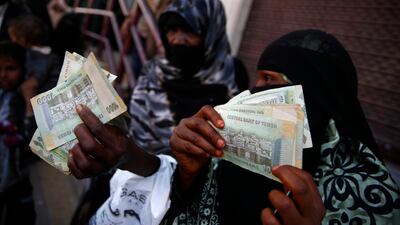The UN children's agency suspended cash transfers to nine million of Yemen's most impoverished citizens under pressure from the country's Houthi rebels.
Unicef said the decision came after it was unable to set up a call centre to get feedback from people receiving aid.
Two anonymous sources said the Houthi rebels, who control northern Yemen, hindered the launch of the call centre because they feared it might reveal their manipulation of the cash transfers.
Wednesday's move comes as Yemen's currency deteriorates, increasing the price of food and fuel and sparking fears of a worsening humanitarian crisis.
The Iran-aligned Houthis have fought a Saudi-led coalition since March 2015. The rebels are also accused of diverting aid to their supporters.
Last week, Houthi security forces banned the country director of a Christian charity from returning to Yemen.
The Adventist Development and Relief Agency faced pressure from Houthis to use the rebels' beneficiary lists when distributing aid and to use Houthi-linked staffers in ADRA-run health centres.
When ADRA's Yemen chief Ephraim Palmero objected, he was told that he would not be allowed to return to the country.
ADRA President Jonathan Duffy said the withdrawal of Mr Palmero's travel credentials is a "threat against delivery" of humanitarian needs.
______________
Read more:
Yemen central bank nearly doubles interest rate to halt riyal plunge
Saudi Arabia's $2bn cash transfer gives hope to Yemenis
Yemenis join the line of refugees seeking help in Jordan
______________
The suspended Unicef payment is the third since the project was launched in August 2017. Unicef said the cash transfers were a "lifeline" to a third of Yemen's people and "contribute to avert the risk of famine and allowed targeted families to buy food and medicine".
The value of the Yemeni riyal is in a steady free-fall. It traded at 800 to the dollar earlier this week, causing immediate price hikes in goods and prompting the Saudis to inject $200 million to shore up Yemen's Central Bank reserves. Before the civil war started in 2015, the riyal was around 215 to the dollar.
With 8.4 million people not knowing where their next meal will come from, the UN Office for the Coordination of Humanitarian Affairs warned last month that a further slide in the riyal could result in an additional 3.5 million Yemenis becoming food insecure, and that more than two million are "likely to be at a heightened risk of famine".
While the Saudi-led coalition imposed a land, sea and air embargo – 90 per cent of Yemen's needs are imported – the Houthis put restrictions on the delivery and distribution of aid to the 19 million Yemenis living in rebel-controlled lands.
In southern Yemen, where the Houthis were pushed out two years ago by the Arab coalition, international relief agencies also face security challenges.
On Tuesday, Doctors Without Borders said it suspended its operation in Dhale after staff were attacked a day earlier. It said no one was injured in the incident.

